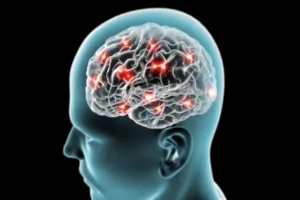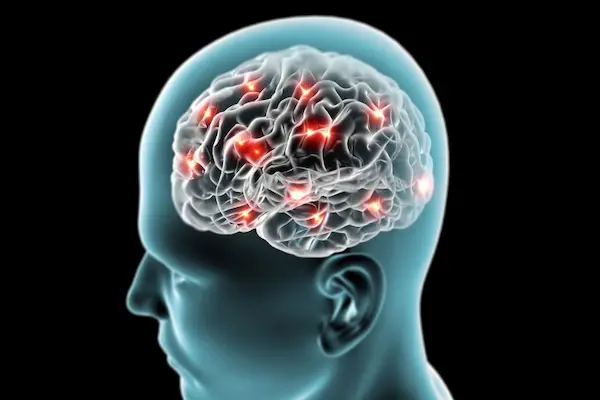
PROMO!
First order? Get 10% OFF with this code: 1storder
Written by

Brain fog is one of the most reported cognitive challenges during menopause. It often shows up as slowed recall, poor focus, or a clouded sense of thinking that disrupts daily routines. Hormonal changes during menopause affect the brain’s regulation of signaling molecules, its use of glucose, and its handling of stress, all of which contribute to brain fog.
As interest in midlife cognitive health continues to expand, researchers are exploring compounds that may interact with these processes in new ways. Among the approaches gaining attention is the study of peptides for brain fog, an area that highlights potential connections between biochemical signaling and sharper mental clarity.
This article examines how peptide research is being applied to cognitive health and why it is becoming a growing area of focus during menopause.
Explore Semax from Peptide Works, a peptide developed for research into brain activity, memory performance, and signaling processes.

Brain fog in menopause develops from a mix of biological and lifestyle factors. The sharp decline in estrogen changes how the brain regulates neurotransmitters and uses glucose, which can affect memory, focus, and overall processing speed. At the same time, sleep disruption from night sweats or hot flashes further weakens attention and recall.
In addition, heightened stress during this stage can elevate cortisol, a hormone that interferes with mental clarity and working memory. Some studies also connect reduced iron levels in midlife women to slower thinking and mood changes. These combined influences are shaping interest in peptides for brain fog, with compounds such as Semax investigated for their potential to support cognitive clarity.
Since these mechanisms affect brain performance on many levels, researchers are now examining how peptides may interact with them to improve clarity and focus.
Brain fog during menopause has been linked to hormone decline, changes in neurotransmitter activity, and rising oxidative stress. Research shows that some peptides for brain fog influence these same processes by modulating neurotrophic factors, neurotransmitter systems, and cellular repair mechanisms.
Semax, a synthetic fragment of adrenocorticotropic hormone, has been reported to elevate brain-derived neurotrophic factor (BDNF), a protein essential for synaptic strength and memory formation. This action is notable because lower estrogen often parallels reduced BDNF expression. Selank has been studied for its role in stabilizing serotonin and dopamine activity, functions tied to mood and attention.
Studies also highlight Epithalon for its antioxidant and telomere-related effects, while BPC-157 shows activity in neural and vascular recovery. Together, these findings expand ongoing exploration of peptide activity in the context of menopausal cognitive changes.
Among these peptides, Semax often receives closer attention because of its strong association with learning and memory.

Semax is a laboratory-designed peptide examined for its influence on cognitive functions such as learning, memory, and attention. During menopause, lower estrogen disrupts neural communication and increases stress hormones, both of which contribute to brain fog. Research indicates that Semax may enhance synaptic signaling and support the release of brain-protective proteins involved in memory formation.
As one of the more widely studied peptides for brain fog, It has also been associated with improved focus under mental strain, making it relevant where stress and fatigue worsen cognitive clarity. While Semax is prominent in this field, other peptides such as Selank are also being studied for their potential impact on cognition during menopause.
While Semax is studied mainly for memory pathways, Selank’s research emphasizes mood and stress regulation, two other drivers of brain fog.
Selank has been studied for its ability to reduce anxiety and stabilize mood, effects that are highly relevant for women in menopause. Fluctuating hormones can intensify stress responses and impair concentration, both of which contribute to brain fog.
Research suggests that Selank modulates serotonin and GABA activity, helping to calm neural overactivity without causing sedation. By lowering anxiety and supporting balanced neurotransmission, Selank may create conditions where focus and memory function more efficiently.
These actions distinguish it from other peptides and explain why it is being investigated as a possible aid for menopausal cognitive symptoms. Beyond mood and neurotransmission, Epithalon is of interest for its links to aging biology and circadian control.
Discover Selank from Peptide Works, examined in research on peptides for brain fog in menopause, especially its role in mood balance and stress response.

Epithalon peptide is studied for its influence on cellular aging and oxidative balance, both of which are connected to cognitive performance. Evidence suggests that it may activate telomerase, maintain telomere length, and reduce oxidative stress. These mechanisms are relevant in menopause, where cellular decline and oxidative damage often contribute to slower thinking and reduced clarity.
Research has also linked Epithalon to increased melatonin synthesis and improved circadian regulation. Since disrupted sleep is a recognized factor in menopausal brain fog, these findings highlight another pathway by which Epithalon is being examined in the context of cognitive function.
In parallel, BPC-157 has been investigated for how it affects vascular health and neural repair pathways.
Check out Epithalon from Peptide Works, a peptide researched for its connection to cellular longevity, circadian regulation, and oxidative balance supporting cognitive health.
BPC-157 is a synthetic peptide examined for its neuroprotective and anti-inflammatory effects. Research shows that it may enhance vascular stability and support cerebral blood flow, processes directly tied to attention and processing speed. These links make BPC-157 relevant when considering peptides for brain fog, particularly in menopausal women where vascular changes often contribute to cognitive decline.
Studies also indicate that BPC-157 can influence neural repair pathways and reduce oxidative stress in the central nervous system. This distinct profile sets it apart from other peptides being studied in the context of menopausal brain fog.
Because these peptides act through different domains, researchers often compare them to understand their distinct roles in cognitive health.
Explore BPC-157 from Peptide Works, considered within studies of peptides for brain fog in menopause, focusing on vascular stability and neural repair pathways.
Research on the comparison of Semax vs Selank, along with Epithalon and BPC-157, reflects the complexity of brain fog in menopause, where multiple biological systems are involved. Each peptide is investigated within a distinct mechanistic framework rather than a single explanatory model.
Semax is linked to memory and adaptive signaling, Selank to stress–immune regulation, Epithalon to circadian alignment and cellular aging, and BPC-157 to vascular integrity and repair responses. Current investigations emphasize how these peptides are positioned within different domains of inquiry related to peptides for brain fog.
| Peptide | Key Role | Research Angle |
|---|---|---|
| Semax | Learning and memory signals | Neurotrophic regulation |
| Selank | Stress and focus balance | Neuroimmune modulation |
| Epithalon | Sleep and aging connection | Circadian and telomere studies |
| BPC-157 | Repair and circulation | Vascular and recovery pathways |
These comparisons create a framework for considering how future studies may shape the role of peptides in addressing brain fog during menopause.
Research into peptides for brain fog including Semax, Selank, Epithalon, and BPC-157—is still developing. Each peptide is linked to different areas of study, such as memory pathways, stress response, circadian rhythm, and vascular repair.
Early findings are encouraging, but more research is needed to define how these compounds may be applied in the future. The variety of directions gives hope for better ways to understand and manage brain fog in menopause.
At Peptide Works, we provide research-grade peptides worldwide to support ongoing scientific discovery.
All peptides and compounds mentioned are strictly for research purposes only and not for human use.
[1] Gava G, Orsili I, Alvisi S, Mancini I, et al. Cognition, Mood and Sleep in Menopausal Transition: The Role of Menopause Hormone Therapy. Medicina (Kaunas). 2019 Oct 1;55(10):668.
[2] Maki PM, Jaff NG. Menopause and brain fog: how to counsel and treat midlife women. Menopause. 2024 Jul 1;31(7):647-649.
[3] Garg R, Munshi A. Sleep and Brain Function at Menopause. J Midlife Health. 2024 Oct-Dec;15(4):221-224.
[4] Zhu C, Thomas EH, Li Q, Arunogiri S, Thomas N, Gurvich C. Evaluation of the Everyday Memory Questionnaire-Revised in a menopausal population: understanding the brain fog during menopause. Menopause. 2023 Nov 1;30(11):1147-1156.
ALL CONTENT AND PRODUCT INFORMATION AVAILABLE ON THIS WEBSITE IS FOR EDUCATIONAL PURPOSES ONLY.
DISCLAIMER: These products are intended solely as a research chemical only. This classification allows for their use only for research development and laboratory studies. The information available on our Peptide Works website: https://peptide-works.com/ is provided for educational purposes only. These products are not for human or animal use or consumption in any manner. Handling of these products should be limited to suitably qualified professionals. They are not to be classified as a drug, food, cosmetic, or medicinal product and must not be mislabelled or used as such.
Peptide Works
Related Articles

What are the Best Cognitive Peptides?
Cognitive peptides are short chains of amino acids that researchers are exploring for their potential effects on brain function. They

Achieving increased skin pigmentation without prolonged sun exposure has been demonstrated with Melanotan peptides in research. Two commonly studied options,

Can PTD-DBM Hair Growth Peptide Stop Balding?
Hair thinning and balding affect millions worldwide, often leading to frustration and limited options. This challenge has driven researchers to